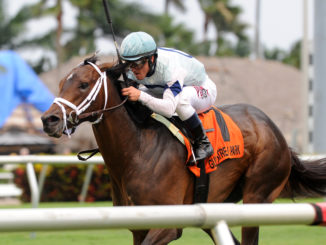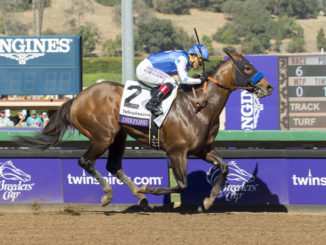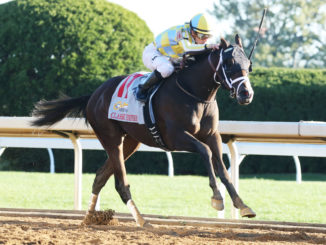
by Teresa Genaro
They sure don’t do things like they used to at Saratoga Race Course.
Back in 1922, the Alabama Stakes was already a venerable race, having been first run in 1872, and it attracted a fine field of fillies for that 42nd running nearly a century ago.
Not unlike this summer, that 1922 meet was plagued by rain, and the day before the Alabama, August 8, the New York Times correspondent characterized the track as “slow and lifeless,” a result of the recent bad weather.
On the day of the big filly stakes race, the track had, reported the Times, “improved somewhat and was not as lumpy” as it had been, “but was still slow.”
The Alabama favorite was Emotion, owned by R. L. Gerry. She was even money, but the nine-furlong race went to 4-1 Nedna, who won wire-to-wire in 2:08. “A fast time,” read the Times, “could not be expected on such a track.”
“In her victory,” opined a writer in the Daily Racing Form, “Nedna proved that she is in every sense worthy to have her name inscribed with those other queens of the turf that have been returned Alabama winners.”
Not everyone shared his opinion.
Four days later, the Saratoga Association, the organization that oversaw racing at Saratoga until 1955, announced that a new, $1,500 stakes race would be added because, reported the Form, “there has been much discussion as to whether Nedna…was the best horse” in the Alabama. The new race would also be run at a mile and a quarter, and it was scheduled for August 30, joining the Saratoga Cup and the Hopeful on the closing day of the meet.
Although of the Alabama contestants were expected to run back in the race that would come to be called The Test, it turned out to be a match race between W. P. Thompson’s Nedna and Emotion, run over a track described as “dry on top [and] extremely heavy underneath.”
As in the Alabama, it was Nedna that went to the lead, maintaining an easy lead over her rival until the far turn. Instead of fading in the final stages of the race, as she had in their prior race, Emotion mounted a challenge.
“The pace was slow, and Emotion proved to have speed in reserve after she made the turn for home,” read the DRF account. “Both fillies swung wide into the stretch and Nedna was going so easily that [jockey] Keogh was looking back. Then when inside the eighth pole it all changed. Emotion, closing up steadily, drew alongside. Keogh loosened his hold on the Thompson filly and asked her to run faster. She did not respond to his call and he drew his whip. It fell once on her flanks and then he tried to ride her hard, but it was of no avail, and Emotion, coming on straight and true, passed by her and at the end was the winner by something more than a length.”
The New York Times had the final time as 2:11.1-5. Emotion was ridden by J. Linus McAtee, who was inducted into the Hall of Fame in 1956.
Why was the Alabama result thought to have been unsatisfactory? And who, specifically, raised enough of a cry that the Saratoga Association humored their complaint?
The answers to those questions appear in neither the pages of the Times nor of the Racing Form; the latter said that Nedna had had a weight advantage in the Alabama, while the former has each filly carrying 114 pounds. They both carried 115 in the Test.
Readily available information on Emotion is scant, but according to Allan Carter, the historian at the National Museum of Racing and Hall of Fame, she was bred by John Madden and by Friar Rock out of the Isidor mare Affection. She had a number of owners and raced 46 times, with a record of 12-11-11 and earnings of $20,271. She ran second in the 1921 Beldame Stakes at Belmont and the 1922 Coaching Club American Oaks, her best stakes finishes other than the Test, which was her only stakes win.
The Form had praised Nedna’s performance as as worthy as any other Alabama winner; the Times, perhaps a bit smugly, saw it another way.
“The Test…was carded as a result of the belief on the part of some turfmen that the Alabama was not a truly run race,” read the recap of the Test. “The result seems to bear out their contention.”



